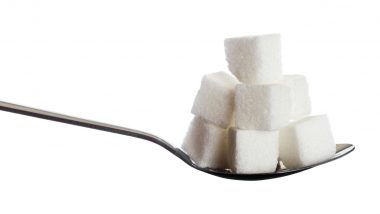If you are wondering what makes your food "sugar-free" but still tastes super sweet- well, it is Saccharine. It is a synthetic sweetener used as a sugar substitute in many foods and beverages. While it is considered safe for most people, there have been some concerns raised about its potential health risks, particularly in relation to bladder cancer and metabolic disorders. More research is needed to fully understand the long-term effects of saccharine consumption, but for now, it is approved for use in many countries within specified limits. Despite it being approved, it is one of the unhealthiest items to consume. Let's learn more about it. Liquid Nitrogen, Dry Ice, Synthetic Sweetener Saccharin, Rhodamine-B in Cotton Candy and Manchurian and Ethylene Oxide in Spices! Foods to Avoid for Kids as Well as Adults.
What is Synthetic Sweetener Saccharine?
Saccharine is a synthetic sweetener that has been used for over a century as a sugar substitute. It is about 300 to 400 times sweeter than sucrose (table sugar) but has no caloric value, making it popular in various food and beverage products marketed as "sugar-free" or "diet."
Health Risk and Side Effects of Saccharine in Food
Despite its widespread use, saccharine has been a topic of controversy due to health concerns. Studies linked saccharin consumption in rats to bladder cancer, leading to warning labels being mandated on products containing saccharin in the United States. However, subsequent research has questioned these findings, suggesting that the mechanism of bladder cancer in rats may not apply to humans. Having Over 5 Grams of the Artificial Sweetener a Day Can Prove To Be Fatal, Suggest Doctors.
Saccharin is approved for use in many countries, including the United States and Canada, with regulatory bodies such as the FDA and Health Canada considering it safe for human consumption. The acceptable daily intake (ADI) of saccharin is established by these agencies based on the latest scientific evidence.
While saccharin is generally considered safe for most people, some individuals may experience side effects. These can include allergic reactions, digestive issues (such as bloating, gas, or diarrhoea), and potential effects on gut microbiota. Some studies have also suggested a link between artificial sweeteners like saccharin and metabolic disorders, such as glucose intolerance and changes in gut bacteria.
It is important to note that the safety of saccharin and other artificial sweeteners is still a topic of ongoing research and debate. While some studies have raised concerns about potential health risks, others have found no adverse effects. As with any food additive, moderation is key, and individuals should consult with healthcare professionals if they have specific health concerns or conditions.
(The above story first appeared on LatestLY on Apr 24, 2024 12:46 PM IST. For more news and updates on politics, world, sports, entertainment and lifestyle, log on to our website latestly.com).













 Quickly
Quickly




















